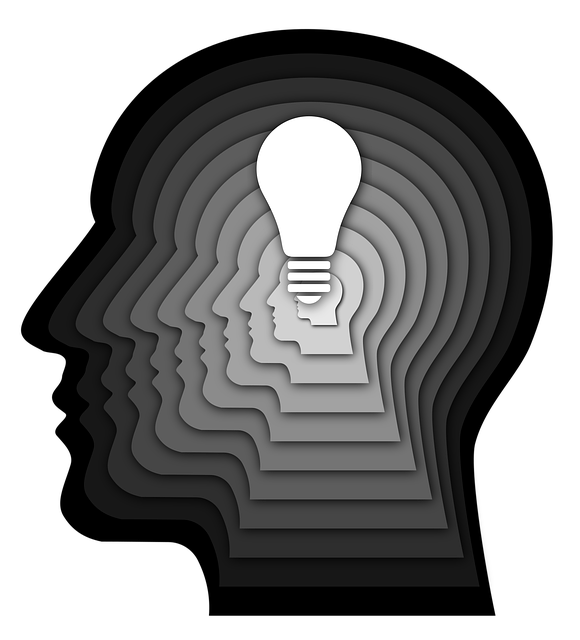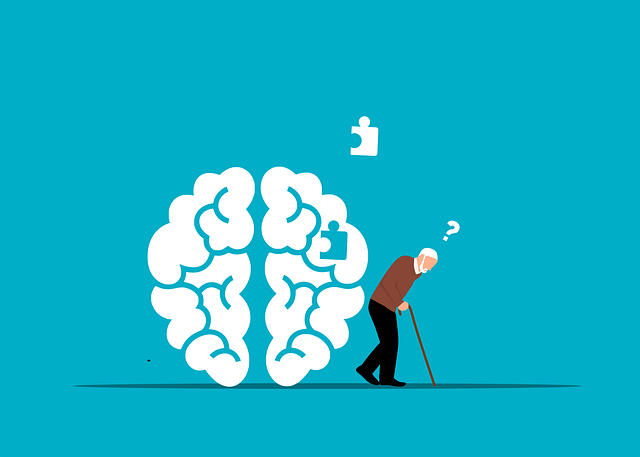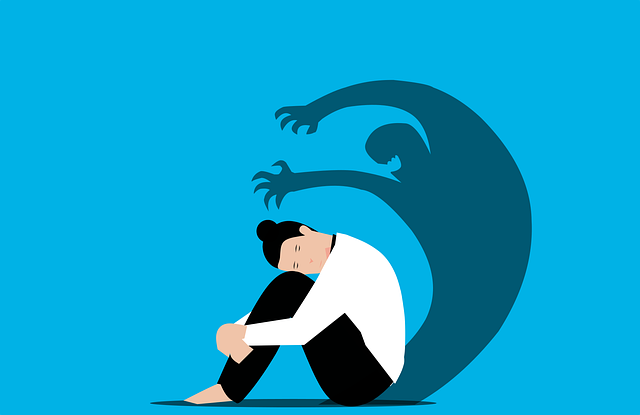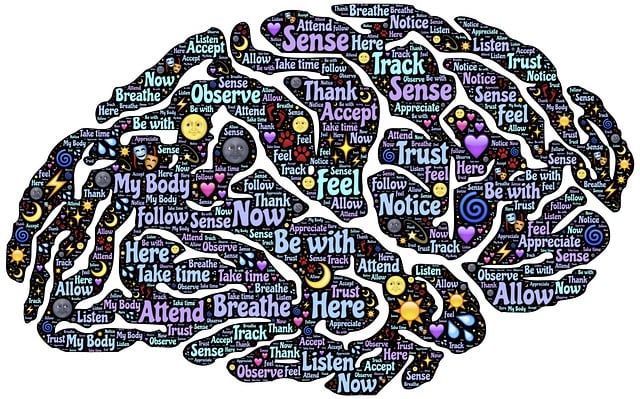Developing Emotional Intelligence (EI) is crucial for enhancing mental well-being, particularly through managing anxiety. High EI associates with better mental health outcomes and is fostered by therapy for anxiety, mental health education, and community outreach programs addressing root causes of anxiety. Self-awareness practices like meditation, mindfulness, and goal setting help individuals observe thoughts without judgment, identify triggers, and cultivate resilience. Empathy building through listening and self-care strengthens relationships and mental wellness, contributing to overall well-being. Mindfulness and emotion regulation techniques, such as meditation and relaxation exercises, serve as effective therapy for anxiety, reducing stigma and promoting mental illness recovery.
Emotional intelligence (EQ) is a powerful tool for navigating life’s challenges, particularly when it comes to mental well-being. In this article, we explore the multifaceted impact of EQ on our daily lives and mental health. From understanding its core components to implementing effective strategies, we delve into identifying and managing anxiety, enhancing self-awareness, cultivating empathy, and practicing mindfulness. Discover how these techniques can serve as a therapy for anxiety and foster healthier relationships.
- Understanding Emotional Intelligence and its Impact on Mental Well-being
- Identifying and Managing Anxiety: A Key Component of EQ
- Strategies for Enhancing Self-Awareness in Daily Life
- The Role of Empathy in Building Strong Relationships and Reducing Social Anxiety
- Practicing Mindfulness and Emotion Regulation Techniques for Long-term Anxiety Management
Understanding Emotional Intelligence and its Impact on Mental Well-being

Understanding Emotional Intelligence (EI) is a crucial step towards enhancing one’s mental well-being. EI refers to the ability to recognize, understand, and manage our own emotions, as well as perceive, interpret, and influence the emotions of those around us. This concept goes beyond mere empathy; it involves self-awareness, self-management, social awareness, and relationship management skills. By cultivating EI, individuals can navigate complex interpersonal interactions with greater ease, fostering healthier connections and improving their overall mental health.
High levels of emotional intelligence are closely linked to better mental health outcomes, including reduced symptoms of anxiety and depression. Therapy for Anxiety often incorporates EI-building techniques as part of its treatment approach, recognizing that enhancing self-esteem improvement and promoting emotional healing processes can significantly contribute to long-term recovery. Mental Health Education Programs Design that incorporate EI development have proven effective in empowering individuals with the tools needed to recognize early warning signs of mental distress, fostering resilience, and cultivating a deeper understanding of their emotional responses.
Identifying and Managing Anxiety: A Key Component of EQ

Identifying and managing anxiety is a vital aspect of emotional intelligence development. High levels of anxiety can significantly impact an individual’s ability to effectively navigate social situations, make sound decisions, and maintain healthy relationships—all key components of EQ. While occasional anxiety is a normal response to stress, chronic or intense anxiety often requires professional intervention. Therapy for anxiety, such as cognitive-behavioral therapy (CBT), has proven effective in helping individuals understand and manage their anxiety symptoms. This therapeutic approach equips clients with coping strategies to challenge negative thought patterns and engage in more adaptive behaviors.
Community outreach programs focused on mental health can play a crucial role in promoting inner strength development and social skills training, addressing the root causes of anxiety. By fostering open discussions about mental health issues and providing accessible therapy options, these initiatives empower individuals to take charge of their emotional well-being. Ultimately, integrating strategies for identifying and managing anxiety into personal growth journeys contributes significantly to building a more robust emotional intelligence framework.
Strategies for Enhancing Self-Awareness in Daily Life

Developing self-awareness is a powerful tool for enhancing emotional intelligence. In today’s fast-paced world, where folks often navigate a labyrinthine path of stress and anxiety, taking time to pause and reflect can be transformative. Simple practices like mindful meditation allow individuals to observe their thoughts and emotions without judgment, fostering a deeper understanding of themselves. By engaging in this process consistently, one can identify triggers for negative feelings and develop strategies to manage them effectively. For instance, therapy for anxiety is not just about treating symptoms; it empowers individuals to recognize the patterns that contribute to their distress, enabling them to cultivate positive thinking and build resilience.
Additionally, incorporating confidence-boosting activities into daily routines can significantly impact self-awareness. Setting achievable goals and celebrating small victories create a sense of accomplishment, reinforcing a positive feedback loop. This reinforces a sense of control over one’s life, which is crucial for managing anxiety. As previously mentioned, promoting positive thinking goes hand in hand with building self-awareness; it encourages individuals to challenge negative thought patterns and replace them with realistic, empowering beliefs. Thus, by combining mindfulness, goal setting, and positive affirmations, people can enhance their emotional intelligence and achieve better anxiety relief.
The Role of Empathy in Building Strong Relationships and Reducing Social Anxiety

Empathy plays a pivotal role in cultivating strong relationships and fostering an environment of support, understanding, and connection. By practicing active listening and putting ourselves in another person’s shoes, we can build deeper connections with friends, family, colleagues, and even strangers. This skill is particularly beneficial for individuals navigating social anxiety, as it helps to bridge the gap between oneself and others, reducing feelings of isolation and fostering a sense of belonging.
Incorporating empathy into our interactions not only strengthens personal relationships but also contributes to overall mental wellness. Engaging in self-care practices that encourage mindfulness and emotional awareness can significantly enhance one’s ability to empathize. Moreover, participating in community outreach program implementations or joining a mental wellness podcast series production can provide valuable insights, strategies, and support networks for cultivating empathy and managing social anxiety through therapy for anxiety.
Practicing Mindfulness and Emotion Regulation Techniques for Long-term Anxiety Management

Practicing mindfulness and emotion regulation techniques offers a powerful therapy for anxiety, enabling individuals to cultivate emotional intelligence. By focusing on the present moment and acknowledging feelings without judgment, one can gain better control over their anxious thoughts. Mindfulness meditation, deep breathing exercises, and progressive muscle relaxation are effective tools to calm the mind and body, reducing long-term anxiety.
These techniques foster mental wellness podcast series production by enhancing self-awareness and understanding of emotional triggers. Regular practice contributes to Mental Illness Stigma Reduction Efforts, as it empowers individuals to manage their anxiety in a healthy way, promoting overall well-being and resilience.
Emotional intelligence is a powerful tool for enhancing mental well-being and fostering healthy relationships. By understanding and managing anxiety, increasing self-awareness, practicing empathy, and adopting mindfulness techniques, individuals can navigate life’s challenges with greater ease. These strategies not only promote personal growth but also revolutionize how we connect with others, ultimately leading to improved social interactions and reduced anxiety symptoms. Incorporating these practices into daily routines can serve as an effective therapy for anxiety and contribute to a more fulfilling life.








